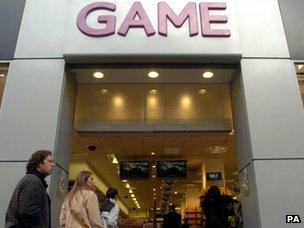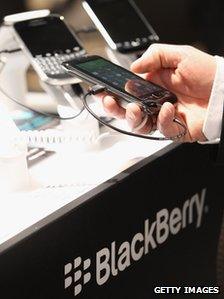The future of technology... who knows?
- Published
- comments

Apple's move into slick stores was derided in 2001
Predicting the future shape of the technology industry is a risky business.
Here's the chief engineer of the Post Office, Sir William Preece, in 1878: "The Americans have need of the telephone, but we do not. We have plenty of messenger boys."
Or the boss of a major computer manufacturer in 1977: "There is no reason for any individual to have a computer in his home."
And how about this from a retail analyst in 2001 on Apple's plans to open a chain of retail stores: "I give them two years before they're turning out the lights on a very painful and expensive mistake."
The quote is in an article from Business Week's archive, external which has been doing the rounds over the past few days. The author analyses Steve Jobs' plans to improve the experience of buying a computer on the High Street, and concludes that they just don't add up. And his column is brimming with lines that look, well, somewhat flaky a decade on.
Here's Apple's former chief financial officer, Joseph Graziano: "Apple's problem is it still believes the way to grow is serving caviar in a world that seems pretty content with cheese and crackers." And this advice from the article's author on the whole approach to new products: "A good step would be to end the 'think secret' approach that shrouds every new-product announcement." The piece concludes with this zinger: "Maybe it's time Steve Jobs stopped thinking quite so differently."
In 2012 we know that Apple's retail operation has been a resounding success. Last year, a study showed that the stores generated far more sales per square foot than any other American retailer - seven times as much, for instance, as Best Buy. As for offering caviar - in the form of luxury-priced products - or being obsessive about secrecy, both strategies seem to have worked out reasonably well for what is now the world's most valuable business. And a decade of "thinking different" from Steve Jobs transformed the technology industry.

Game has not had the same good fortune
But then hindsight is a wonderful thing. In 2001, just after the bursting of the dotcom bubble and in uncertain economic times, launching a new retail chain looked brave, if not foolhardy. With sales moving online, other electronics retailers have struggled to prosper on the High Street, as has been all too apparent in recent weeks. (See my recent post, Game over on the High Street?)
The conventional wisdom back in 2001 was that computers had become commoditised, beige boxes which all looked the same, with consumers ever more price conscious. So it was hard to see that telling them they needed to pay twice as much for something just because it looked better was ever going to work.
And if Apple had remained a niche computer company, the article's predictions might have come true. Instead, Jobs managed to move into music through the iPod, then mobile communications with the iPhone and finally to redefine what we mean by a computer with the iPad.
The success of all these products was rooted in the philosophy mocked by the firm's former CFO in that article - that people aspire to caviar rather than cheese and crackers. The perfectionist attention to aesthetics looked a bit mad in 2001 when the business made a loss of $25m, and Steve Jobs talked bravely of "a challenging year for us and our industry".

Take predictions of its demise with a pinch of sale
But Apple went on to prove that people would pay more - much more - for products that were both beautiful and functional. And when they were displayed in attractive stores that were the very opposite of the "pile 'em high, sell it cheap" aesthetic that prevailed in most electronics retailers, the crowds would flock to marvel and then buy. The sceptics will say that it has all been a conjuring trick, and that Apple's success is a triumph of marketing over technology. But they can't deny that it has worked.
It does all go to show just how hard it is to predict future trends from the current behaviour of consumers.
For every bet that works out, as Apple's punts on the iPhone and iPad did, there are plenty that don't. Seen many Segways or Sinclair C5s on your street lately? The problem is that when it comes to new technology, consumers are skittish, unreliable, and prone to sudden crazes which soon evaporate.
But the key is that, in the words of Steve Jobs, "people don't know what they want until we show it to them". So consumers may indeed want something different, but until you try it is hard to know.
And that is why when you read that the Blackberry is doomed, or that Microsoft will never make an impression on mobile phones, or that Apple will soon dominate the connected TV market, you need to take it all with a pinch of salt.